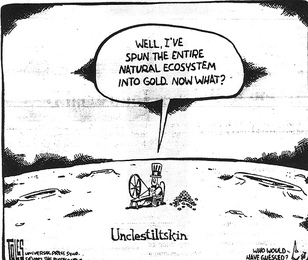Thinking in terms of business ecosystems

Which leads to a digression of sorts from “natural ecosystems” mentioned in the editorial cartoon to “business ecosystems.” Companies need to realize that they function as part of a living, breathing business ecosystem, and that the elimination of even a single participant in this ecosystem can have serious consequences.
A recent Toyota Motor Company feature in FORTUNE magazine (“America’s Best Car Company”) really highlights this point. A Toyota executive explains that the company is doing everything possible to ensure that Detroit’s Big Three (Ford, GM, Chrysler) continue to survive within the automotive ecosystem, even as Toyota continues to gain market share in the U.S. If, say, Ford turns belly-up, Toyota knows that it will be facing the mother of all corporate backlashes in the USA:
“We understand that as Toyota’s presence increases, expectations and
demands will also rise,” president Katsuaki Watanabe told Fortune.
Nuances will matter more than ever. When then-chairman Hiroshi Okuda in
2005 said Toyota might raise prices to take pressure off GM, the
perceived condescension sparked outrage, followed by furious
backpedaling. Okuda’s remark betrayed Toyota’s biggest fear: the
financial collapse of one of the Detroit Three. Jim Lentz tries his
best to deflect such talk. “We’re all in this together,” he says of his
U.S. rivals. “We wish them the best.”
If Toyota cares so much,
why is it entering Detroit’s last bastion of comparative strength? But
Lentz swears that he means it and that the Tundra is simply a way to
offer consumers a choice. The status quo, as he needn’t point out, has
served Toyota well. Despite occasional Japan bashing, Toyota has been
able to grow. This process that has been gradual enough that the
company is now an accepted – in fact, admired – part of the U.S.
landscape. The dramatic failure of any of the Detroit Three would
destabilize the industry – and make Toyota the villain. “The most
important management task at Toyota these days,” says auto consultant
Jim Womack, “is to manage the decline of the domestics.”
[image: Unclestiltskin]




